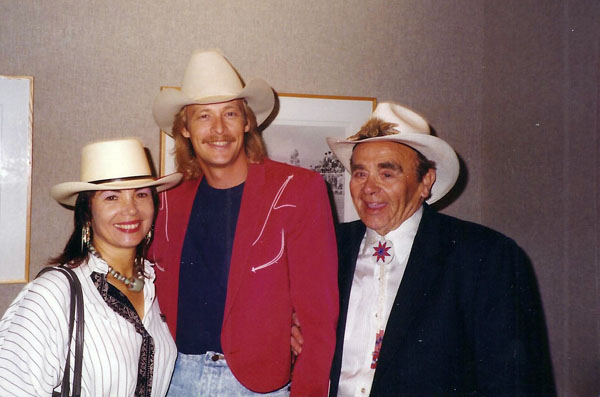
Joan Carol, Alan Jackson and Cliffie Stone at a 1990 event held at the Gene Autry Museum in Burbank, CA. Cliffie loved the new crop of 1990s country stars who kept Mother Country Music alive and well. Alan Jackson was one of Cliffie’s favorite artist/songwriters in that era because he was a traditional singer who, like Merle Haggard, wrote many of his own hit songs. In 1989, Alan was the first artist to be signed with the newly-formed Arista/Nashville, which was headed by Tim DuBois. His debut album , ‘Here in the Real World,’ was produced by Keith Stegall (who would produce most of Alan’s albums). The album went platinum and spawned four Top Five hits: ‘Here in the Real World,’ ‘Chasin’ that Neon Rainbow,’ ‘Wanted,’ and ‘I’d Love You All Over Again’ which became his first #1 hit. Other hit songs from his early Arista album releases include, ‘Don’t Rock the Jukebox,’ ‘Love’s Got a Hold On You,’ ‘She’s Got the Rhythm (and I’ve Got the Blues),’ ‘Chattahoochee,’ and ‘Midnight in Montgomery.’ Cliffie always called Alan the “John Wayne of Country Music” because he was down-to-earth, humble and a man of few words, who projected strength of character when he walked out on stage and started singing. In 1999 and 2000, Cliffie’s ‘John Wayne of Country Music’ description of Alan manifested itself in two courageous events: Alan’s hero was country icon, George Jones, whose song, ‘Choices’ was nominated for CMA’s ‘Song of the Year’ category. He was invited to sing a shortened version of it on the 1999 Country Music Awards show, but George declined and did not attend the awards show. When Alan Jackson heard about this, he rearranged his own CMA nominated song ‘Pop A Top.’ When he was half way through singing his song, he and his band segued into George Jones’ song, ‘Choices.’ After singing it, Alan quietly walked off the stage while the audience gave him a standing ovation. The other gutsy event occurred in 2000, which has an interesting background story. Nashville songwriters, Larry Cordle and Larry Shell, co-wrote a song called “Murder on Music Row;” their song was a lamented indictment about the changing sound of traditional country music when rock/pop crossovers artists started dominating the country music scene. Larry Cordle and his bluegrass group, Lonesome Standard Time released it in his 1999 album. Somewhere down the line, Tony Brown, George Strait’s producer, heard it and he had George listen to it. George then contacted Alan Jackson and invited him to do a duet with him. The song was recorded for George’s ‘Latest Greatest Straitest Hits’ album which was released in 2000. The Academy of Country Music invited George and Alan to open their 2000 ACM Awards show with this song and these two multi-platinum superstars courageously performed it. It caused quite a debate in the country music community about the direction and current state of affairs in country music. Although the song was not officially released as a single on George’s album, the album cut got enough unsolicited airplay to make it peak at #38 on Billboard’s Hot Country Singles. In 2000, they received the Country Music Association’s Award for ‘Vocal Event of the Year’ for this song. In the wake of September 11, 2001’s terrorist attacks in New York City, Alan felt the need to express his thoughts and emotions about this horrific tragedy, and he wrote a song called ‘Where Were You (When the World Stopped Turning).’ During this same time period, Alan was scheduled to perform his current #1 hit song ‘Where I Come From’ on the CMA Awards show. Nancy Russell, Alan’s manager, decided to play ‘Where Were You’ to four of CMA’s top executives and they approved of the song being performed on their awards show instead of Alan’s #1 hit. The multi-talented host of CMA’s award show, Vince Gill, introduced Alan, who poignantly sang ‘Where Were You (When the World Stopped Turning.)’ The audience tearfully gave him a standing ovation. Many radio stations took this song from the TV broadcast and started playing it on their stations; and this unsolicited airplay made the song debut at #25 on the Billboard country charts. Arista sent promotional singles to radio stations and ‘Where Were You’ went to #12. By December 29, 2001, it charted at #1 and spent five weeks at #1 on the country singles charts; simultaneously, it was also being played on top 40 Pop hits and it peaked at #28. Tim DuBois and other Arista executives then moved the release date of Alan’s new album, ‘Drive,’ to January 15, 2002. The album went to the top of the Billboard Country Charts and Billboard Pop Charts and it stayed at #1 for four weeks. As Billboard’s Deborah Price succinctly stated: “A multitude of songs have been written and recorded in the wake of September 11, but none of them captures the myriad of emotions unleashed by the terrorist attacks on an unsuspecting nation more perfectly then Jackson’s eloquent ballad.’ In 2001, he won both the ACM and CMA awards for ‘Song of the Year’ and ‘Single of the Year.’ In 2003, it earned Alan his first Grammy Award for ‘Best Country Song.’ Alan’s reaction to how he felt about the success of ‘Where Were You’ was spiritually humble: “I think it was Hank Williams who said, ‘God writes the songs, I just hold the pen.’” Alan became a member of the Grand Ole Opry in 1991. In 2001, he was proud to be inducted into the Georgia Music Hall of Fame. In 2010, he received a Star on the Hollywood Walk of Fame. On September 24, 2012, the Academy of Country Music presented Alan with their ‘Jim Reeves International Award’ at their 6th Annual ACM’s Honors Award Show. It’s only a matter of time until Alan will be inducted into the Country Music Hall of Fame. Visit: www.alanjackson.com to view his bio, massive discography, and numerous nominations and awards.